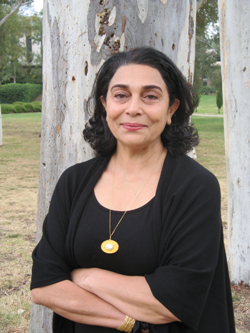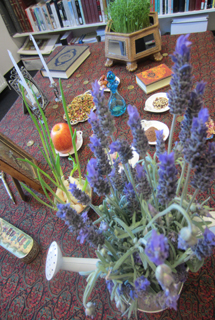Congratulations go to Dr Zarah Taheri for her recognition as a candidate amongst the best at ANU in the 2015 Vice Chancellor's teaching excellence awards.
"The most notable strength of the course was the personal knowledge of Zahra. She has an amazing and in-depth knowledge from both reading and first-hand experience of Iran and its history and political system.”
Student
 Teaching has been as much of a learning experience for Zahra Taheri as it has for her students. Years of teaching Persian language to non-native speakers, as well as teaching non-language courses on Iranian History and Culture, has placed her on a continual search for new and effective teaching techniques. As one of the few scholars at ANU who teaches both language and non-language courses, she has been actively involved in teaching Persian language courses at all levels, as well as the non-language courses of Iranian History and Culture, Gender and Culture in Iran and the Middle East. She has designed and established two new courses for students, and is currently writing a program for Applied Persian.
Teaching has been as much of a learning experience for Zahra Taheri as it has for her students. Years of teaching Persian language to non-native speakers, as well as teaching non-language courses on Iranian History and Culture, has placed her on a continual search for new and effective teaching techniques. As one of the few scholars at ANU who teaches both language and non-language courses, she has been actively involved in teaching Persian language courses at all levels, as well as the non-language courses of Iranian History and Culture, Gender and Culture in Iran and the Middle East. She has designed and established two new courses for students, and is currently writing a program for Applied Persian.
Zahra’s approach to teaching and supporting student learning
Teaching has always been my ultimate delight. The enthusiasm stems from the joy I experience in interacting with students and sharing my knowledge with them. My basic objective in teaching, besides enhancing communication skills, is to introduce students to the literary, historical, social, and cultural aspects of Persian Language and literature. In doing so, I utilise a variety of interactive methods that encourage exploration rather than passive acquisition of facts and figures. Delivering engaging lectures, involving students in the process of learning, and creating activities to take place outside the classroom are the keys to my successful teaching. I believe in building a strong relationship with each student, and creating a balance between challenge, enjoyment and motivating students to learn, which in turn leads to higher engagement. In my lectures for the course I teach on Iranian History and Culture MEAS2000, I share my memories of the 1979 Iranian Revolution with my students when discussing the modern history of Iran. Feedback I have received from students indicates that it is fascinating for them to listen to an eye-witness of such a historical event, coming straight from the mouth of a university student who was then involved in the street protests, and had experienced the roller-coaster process of hope and disappointment. In addition to discussing the accounts written by modern historians and analysing the causes and results of the Iranian Revolution, I share my memories with students about the days and nights of the revolution in our home, neighbourhood, university, and town.
 I am a strong believer in outside-the-classroom-activities as an important component in language learning. During my years of teaching Persian and Iranian Studies in three different cultural and academic environments in Iran, University of California, Berkeley, and Tokyo University of Foreign Studies, I have always arranged Persian cooking classes for my students. This allows them to maximise their opportunities for language use, while also becoming more familiar with Persian culture. I have also celebrated the Persian New Year, Nowruz, with my students every year by arranging the traditional Nowruz setting haft-seen in my office for one week, beginning March 21. I teach the history of this ancient tradition in my class before the celebration starts, and have found it adds an interesting angle of Persian culture for both my language and non-language classes. The cooking classes and Nowruz celebration setting have been influential in enhancing my students’ understanding and appreciation of Persian culture, history, and language and have also played an important role in motivating and inspiring them to further their Persian studies.
I am a strong believer in outside-the-classroom-activities as an important component in language learning. During my years of teaching Persian and Iranian Studies in three different cultural and academic environments in Iran, University of California, Berkeley, and Tokyo University of Foreign Studies, I have always arranged Persian cooking classes for my students. This allows them to maximise their opportunities for language use, while also becoming more familiar with Persian culture. I have also celebrated the Persian New Year, Nowruz, with my students every year by arranging the traditional Nowruz setting haft-seen in my office for one week, beginning March 21. I teach the history of this ancient tradition in my class before the celebration starts, and have found it adds an interesting angle of Persian culture for both my language and non-language classes. The cooking classes and Nowruz celebration setting have been influential in enhancing my students’ understanding and appreciation of Persian culture, history, and language and have also played an important role in motivating and inspiring them to further their Persian studies.